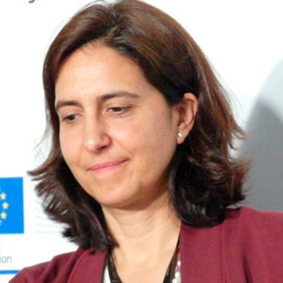Mercedes Giovinazzo
Mercedes Giovinazzo

Mercedes Giovinazzo, holds a Laurea in Archaeology (Università degli Studi “La Sapienza”, Rome, Italy) and a Master’s Degree in Arts Management (École Supérieure de Commerce de Dijon, France).
Since 2005 she is director of Interarts. Her executive management responsibilities include: financial, organizational and institutional policy of the organization, including definition of operational areas and services, of local, national and international institutional relations, of the operational strategy, of internal and external communication, of the revision of the budgeting and accounting system, of human resources; strategic local and international positioning of the organization and identification of public and private partners and funders; supervision of the annual activity program; design and coordination of projects.
She has overseen the overall coordination of diverse projects, such as: Cultural rights to promote development and health – DECIDES in Spain, Latin America and Western Africa; European Expert Network on Culture – EENC in Europe; CulturalBase in Europe; EuroAmerican Campus for Cultural Cooperation and EuroAfrican Campus for Cultural Cooperation Communities of Practice for the Public Value of Culture – SouthMed CV in MENA countries; The Public Value of Culture for Social Cohesion and Urban Development in Africa – Culture at Work Africa in Sub-Saharan Africa. She was Board Member of the Teatro di Roma; president of Culture Action Europe, the European political platform for the arts and culture, and of the “Access to culture” Platform of the European Commission. She co-led the international campaign “The future we want includes culture” advocating for a more prominent role of culture in the UN 2030 Development Agenda. In 2018, she co-founded Disorderly Women – The Alliance of Women Leaders in Culture.
She has been Director of Services and Deputy Director of Customer Services at the Universal Forum of Cultures in Barcelona, Spain; Administrator at the Division of Culture and Cultural and Natural Heritage at the Council of Europe, in Strasbourg, France; and, director of the Mastère Européen Management des Entreprises Culturelles at the École Supérieure de Commerce de Dijon, France. Her mother tongues are: English, Italian, Spanish and Catalan. She is perfectly fluent in French. Author of articles and a frequent speaker at international conferences, she is highly skilled in both written and oral communication, in different languages.
24 September
Master Class: The value of Arts. Beyond performance indicators
Mercedes Giovinazzo.
—
Does culture change lives? Gathering evidences that culture has an impact on society is a major challenge today, not just in policy papers but also in cultural theory and practice. Academics, practitioners, artists and policy makers are trying from different perspectives to tackle the challenge of capturing the value of culture, to prove that it matters and make the case for public funding. But why is this happening? And how could cultural professionals react to this pressure and actually give their own contribution to the debate? Which are the means that we do actually have to gain deeper and easy-to communicate understanding of the impact of our artistic work? How thinking in terms of audience impacts can help us shaping meaningful relationships and narratives? We’ll be honestly exploring the issue together and look into the Theory of Change, a powerful approach framed in the social impact sector that is increasingly adopted (and critically adapted) in the cultural sector.
25 September
Keynote speaker: How participation won, and why it matters
Mercedes Giovinazzo.
Presented by Dea Vidovic.
—
The notion of the ‘public value of culture’ aims to bring culture from the margins to the center of the public sphere, exploring its connections with economic, social and political developments, and using recent relevant data on cultural participation. In addition to the economic value of culture, the social effects of cultural participation for human development (e.g. gender equality, improvement of educational results, mutual understanding among communities, inclusion of disadvantaged groups) have been increasingly recognized internationally. The so-called ‘public value of culture’ combines the economic, social and intrinsic contribution made by cultural participation and creative goods and services in the public space and informs the design and implementation of public policies and independent initiatives. Focusing on the public value of culture enables including the recognition of the effects of culture on social and economic development and takes account EU concerns and priorities but also of broader developments in the international cultural scene, including the UNESCO Convention on the Protection and Promotion of the Diversity of Cultural Expressions, the European Agenda for Culture and the ‘creative economy’ paradigm, which have generally served to broaden opportunities for cultural actors in the public agenda and are generally accepted and welcomed by them.


